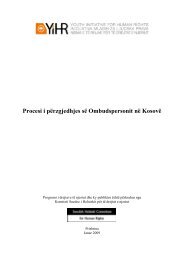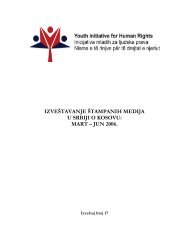Implementation of Transitional Laws in Serbia 2006
Implementation of Transitional Laws in Serbia 2006 - Archive
Implementation of Transitional Laws in Serbia 2006 - Archive
- No tags were found...
You also want an ePaper? Increase the reach of your titles
YUMPU automatically turns print PDFs into web optimized ePapers that Google loves.
<strong>Implementation</strong> <strong>of</strong> <strong>Transitional</strong> <strong>Laws</strong> <strong>in</strong> <strong>Serbia</strong> <strong>2006</strong>received 540 responses, i.e. 72.28 per cent. The fact that an <strong>in</strong>crease hasbeen recorded <strong>in</strong> the percentage <strong>in</strong> which responses are received to therequested <strong>in</strong>formation is positive, because last year 645 requests were sent,and 318 responses were received, i.e. 49.30 per cent. It can be concludedthat <strong>in</strong> comparison to last year, the percentage <strong>of</strong> received <strong>in</strong>formation hasrisen 22.58 percent.In the year 2005, <strong>of</strong> 212 tested organs, 81 obeyed the law, i.e. 30.92 per cent,and <strong>in</strong> <strong>2006</strong> 167 organs <strong>of</strong> public authorities from the 378 tested, whichmeans 44.18 per cent. Therefore, the <strong>in</strong>crease has been recorded here also,as well as an improvement <strong>in</strong> the quality <strong>of</strong> the implementation <strong>of</strong> the law.Appo<strong>in</strong>t<strong>in</strong>g authorized people <strong>in</strong> the public authority bodiesfor action upon requestsMunicipalities <strong>in</strong> <strong>Serbia</strong> were tested on whether they had appo<strong>in</strong>ted theauthorized people for actions upon requests. The law does not regulatethe duty <strong>of</strong> the organs <strong>of</strong> public authorities to name this person, only thepossibility <strong>of</strong> it, and <strong>in</strong> case the authorized person has not been named,the adm<strong>in</strong>istrator <strong>of</strong> the organ is responsible 236 . The Initiative believesthat the appo<strong>in</strong>tment <strong>of</strong> an authorized person would significantly add tothe improvement <strong>of</strong> the implementation <strong>of</strong> the law <strong>in</strong> practice, because<strong>in</strong> every organ <strong>of</strong> public authorities there would be a person whose soleduty would be to enable access to <strong>in</strong>formation <strong>of</strong> public significance, andthere would not be any dilemmas about the potential responsibility for notobey<strong>in</strong>g the law.One hundred forty one requests were sent to the addresses <strong>of</strong> 141municipalities <strong>in</strong> <strong>Serbia</strong>. Eighty four municipalities delivered an answer,among which 66, i.e. 46.80 per cent had named an authorized person,and 18 had not. Sixty eight <strong>of</strong> the tested municipalities did not answer thesubmitted request.236 Ibid, Article 38, Paragraph 262











